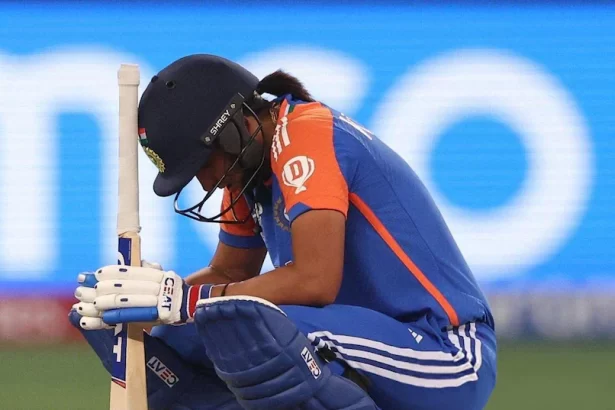In a thrilling ICC Women’s T20 World Cup clash on Sunday, Australia managed a narrow nine-run victory over India, with depth and experience defining the game. Indian captain Harmanpreet Kaur reflected post-match that Australia’s success was largely due to their reliance on collective performance rather than one or two star players. This all-round strength enabled Australia to secure their fourth straight win, advancing to the semifinals unbeaten.
Women’s T20 World Cup
After the game, Harmanpreet shared her thoughts, highlighting that the primary difference between the two teams lay in Australia’s well-rounded approach. “Australia doesn’t depend on one or two players; they have several all-rounders who can step up. They didn’t allow easy runs and have experience that makes a difference,” she commented. Harmanpreet further explained that she and teammate Deepti Sharma missed a few scoring opportunities in their partnership, which ultimately affected India’s chase of 152 runs.
Women’s T20 World Cup, The game remained tense until the final over, where Australia’s Annabel Sutherland’s consistency limited India to just five runs, sealing a nine-run win. Harmanpreet, with an unbeaten 54 off 47 balls, and Deepti (29 off 25 balls) brought India close to victory. However, Sutherland’s disciplined final over highlighted Australia’s balanced team effort, allowing them to maintain their winning streak.
Women’s T20 World Cup, Australia set the pace from the start after winning the toss and opting to bat. Despite a strong start, they found themselves under pressure due to India’s tight bowling. Grace Harris (40 off 41 balls, with five boundaries) and Tahlia McGrath (32 off 26 balls, with four boundaries) were the top scorers for Australia, who managed a total of 151/8. India’s bowlers, particularly Renuka Singh (2/24) and Deepti Sharma (2/28), led an impressive fightback, restraining the Australian run rate. Shreyanka Patil, Pooja Vastrakar, and Radha Yadav each picked up a wicket, keeping the game competitive.
India’s chase was challenging as they lost early wickets, but Harmanpreet and Deepti steadied the innings with a crucial partnership. Radha Yadav’s fielding and bowling contributions also stood out. “Radha was in the game, both fielding and bowling well, which is the kind of character you need on a team,” Harmanpreet noted. But despite their resilience, India struggled to capitalize on some loose deliveries, a missed opportunity Harmanpreet acknowledged as a learning point.
Australia’s balanced bowling attack, led by Sutherland (2/22) and Sophie Molineux (2/32), proved too challenging for India’s batters in the final overs. Megan Schutt and Ashleigh Gardner also took a wicket each, keeping the pressure on India throughout their innings. The Australian team’s all-round approach, with contributions from multiple players, was key to maintaining their unbeaten tournament record.
Following the defeat, India’s path to the semifinals now depends on the result of the upcoming New Zealand-Pakistan game. With two wins and two losses, India currently sits second in the group but must wait to see if they advance based on net run rate or New Zealand’s performance. Harmanpreet expressed optimism but acknowledged that Australia’s collective experience and depth made them a challenging opponent.
Looking ahead, Harmanpreet emphasized that India could gain valuable insights from Australia’s style of play. “We have much to learn from Australia,” she noted, expressing hope to apply these lessons in future games. The Indian team’s efforts showcased their potential, but Australia’s depth across both batting and bowling set a benchmark for others in the tournament.
With this win, Australia enters the semifinals with strong momentum, backed by consistent performances across all facets of the game. Their commitment to team-oriented play has been a standout feature, and their success reflects the importance of balance and flexibility in the T20 format.


